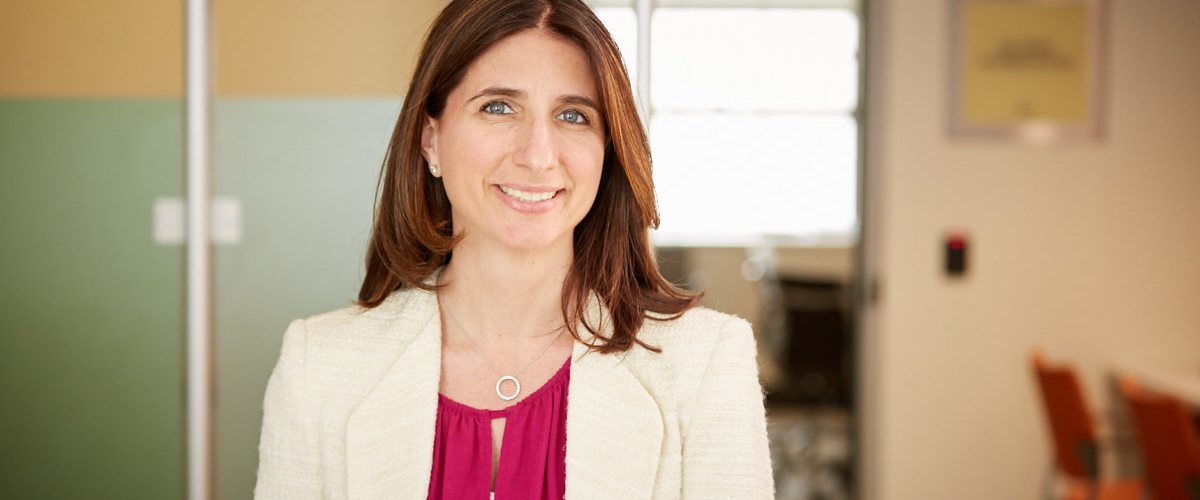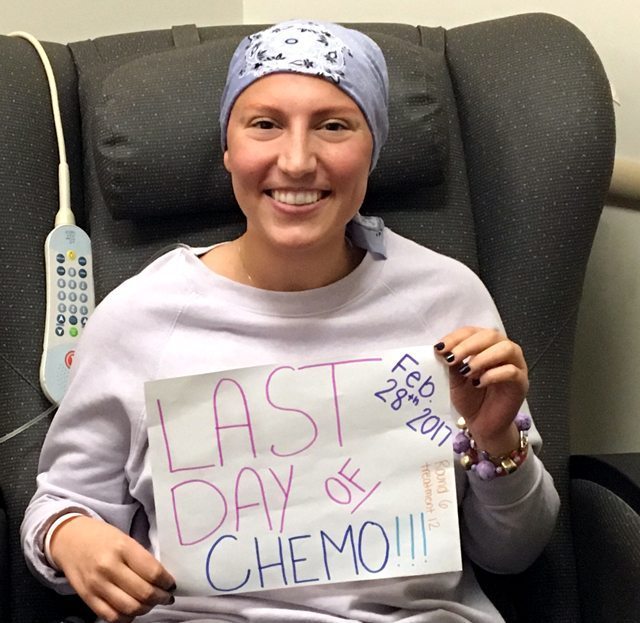When the Doctor Becomes a Patient
A cancer diagnosis helped Dr. Lisa Roth look at healing in a whole new way.


It’s often said that doctors make the worst patients, and Dr. Lisa Roth admits that she was no exception.
In 2012, the pediatric oncologist was so focused on finding less toxic treatments for her young patients with leukemia and lymphoma that she paid little attention to a lump she noticed on her neck while on vacation.
“I told myself, ‘I’m sure this is nothing,’ then ignored it,” says Dr. Roth, who was 33 at the time and newly married. “I was a bad patient,” says Dr. Roth, now the director of the Adolescent and Young Adult Lymphoma Program at NewYork-Presbyterian/Weill Cornell Medical Center and assistant professor of pediatrics and of medicine at Weill Cornell Medicine.
But when the lump didn’t go away, she eventually saw a doctor, who recommended a CT scan. When she looked at her own scan, she saw what no doctor wants to see.
“My heart fell,” she recalls. “The little lymph node in my neck was part of a much larger tumor in my chest.”
She knew immediately that the abnormal cells were lymphoma, a cancer that starts in the cells in the body’s immune system.
When the diagnosis was confirmed as stage II Hodgkin lymphoma, “I knew my chances of surviving were pretty good,” she says. People with stages I and II have a 90 percent five-year survival rate. Even those with the most-advanced stages have an 85 percent chance of surviving five years or more.
Still, the diagnosis “turned my whole world upside down and brought everything to a screeching halt,” she says. “The experience of being a patient, of having to face the unknown, was a lot more difficult than I thought it would be. Even small things can be fraught with anxiety — waiting for scan results, getting a little fever or cough. Suddenly, you find yourself worrying, ‘Is this the beginning of something much worse?’”
What was also challenging was having to stop work for five months during treatment. “I had patients in the middle of the same treatment I was about to go through,” Dr. Roth says of telling them of her diagnosis, “and I had to leave them to care for myself.”
Shortly after her diagnosis, she started chemotherapy treatments every two weeks. Within four months, her disease was in remission.
“Slowly, I was able to go to work and get my life back to where I’d left it.”
Connecting with Patients in a New Way
Dr. Roth relished the opportunity to resume her routine, yet everything felt different.
“The concept of having your whole world turned upside down — that’s universal for cancer patients,” she says. “After my own cancer experience, I got that in a new way. I could really appreciate the impact this diagnosis has, not just on the day you find out but on your whole life perspective.”
That understanding changed the way she interacted with patients.

Katie DeMasi
“It allowed me to bond with them in a new way, a way I couldn’t have before,” she says.
Her new perspective is part of the reason Dr. Roth launched the Adolescent and Young Adult Lymphoma Program at NewYork-Presbyterian/Weill Cornell Medical Center in 2014.
“I wanted to create a program that addresses the unique needs of a young person, ages 15 to 39, with a cancer diagnosis,” she says. “These patients can fall through the cracks. They often feel lost — not quite fitting in to the pediatric clinic, but not the adult clinic, either. They’re more likely to be uninsured than older adults, and they have to worry about distinct issues, like their future fertility.”
Dr. Roth could relate. Before starting her treatment, she froze her eggs to preserve her fertility.
“One of the assets of our Adolescent and Young Adult program is our strong relationship with the reproductive medicine group at NewYork-Presbyterian,” she says. “This group is internationally recognized for their work in fertility preservation for cancer patients. They offer a range of options for fertility preservation in both men and women.
“Like many of my patients, I wanted to maximize my ability to have children later, after my treatment.”
In August 2016, a new 22-year-old patient came her way. Fresh from graduating from nursing school, Katie DeMasi was excited to start a new job at a New York City hospital. Like Dr. Roth, DeMasi thought her symptoms — a chronic sore throat, swollen glands — weren’t anything serious. “I figured it was strep,” says DeMasi. But after a strep test came back negative and a swollen lymph node in her neck didn’t subside after several courses of antibiotics, she went for an ultrasound, then a biopsy. It was Hodgkin lymphoma.
“It was a huge punch in the face,” says DeMasi. “I don’t have cancer in my family. The day before the diagnosis, I was literally looking for apartments in New York City.” Suddenly, she had to refocus. “My mom’s first question was about freezing my eggs. My first question was, ‘When can I start working?’”
Dr. Roth understood this urgency. She’d felt it herself, which DeMasi found comforting. “Because Dr. Roth had been in my shoes, I could relate to her,” says DeMasi. “She wasn’t just a doctor spitting facts at me. She was able to say, ‘This is how I felt” or ‘This happened to me.’ She didn’t sugarcoat anything. She was honest, and that helped me get through the uncertainty that comes with a cancer diagnosis.”
“Being diagnosed with cancer allowed me to bond with my patients in ways I couldn’t have before.”— Dr. Lisa Roth
Even more comforting was learning that her doctor was now a new mom, despite having experienced lymphoma herself. In August 2015, Dr. Roth gave birth to a healthy son. “When you get a diagnosis like this, you wonder, ‘Will my life ever be normal again?’” says DeMasi. “It was reassuring to see that Dr. Roth had gone through it and is now OK. She has a full head of hair and a career and a family.”
The news of DeMasi’s most recent scan, in April 2017, was also reassuring.
“Everything was clear,” says Dr. Roth, who gave her the good news. “There were lots of hugs and tears. I told her to go off and celebrate and eat some sushi, something you can’t do when you’re getting chemo,” she says and laughs.
DeMasi is taking the summer off — “Dr. Roth prescribed it. She said, ‘Yes, relax at the beach!’” — and will then restart her search for a nursing job. “I’m taking it day by day, but I’ve always wanted to be a nurse. I’ve met so many great doctors and nurses at NewYork-Presbyterian that I’m even more excited to help people.”
A Passion for Her Work
Dr. Roth became interested in lymphomas in medical school when she was working at a pediatric HIV clinic in Kenya. There, she encountered many cases of Burkitt lymphoma, a type of non-Hodgkin lymphoma, among children there.
“Different lymphomas have a wide range of prognoses,” says Dr. Roth. “There have been some really great success stories, but there’s so much more work to be done.”
Today, Dr. Roth studies the biology of lymphoma in teens and young adults, offering clinical trials that study the efficacy of new drugs with fewer side effects. Dr. Roth and her pediatrics team are collaborating with Dr. John P. Leonard, interim physician-in-chief at NewYork-Presbyterian/Weill Cornell Medical Center and the Richard T. Silver Distinguished Professor of Hematology and Medical Oncology at Weill Cornell Medicine. Together, they are developing a phase II trial for adolescents and young adults with mediastinal B-cell lymphoma, a fast-growing non-Hodgkin lymphoma that particularly affects young women.
“I try to address the unique needs of this age group, both in terms of planning for a long, healthy life after treatment and also by finding more targeted therapies with fewer side effects,” she says.
Side effects may include lowered blood cell counts, fatigue and nausea, as well as more long-term problems like heart damage and developing treatment-related cancers down the line.
Dr. Roth says she continues to view her work with excitement, only now with the fresh eyes of a cancer survivor.
“I think of the whole experience as an asset. It has made me a better doctor,” she says. “I certainly identified with my patients before, but I relate to them differently now, because of all the little nuances that only someone who has gone through cancer can appreciate.”
Dr. Roth’s story was recently selected to be featured in the Biden Cancer Initiative’s #CancerFIERCE campaign, which provides survivors with a platform to share their own unique cancer experiences. Learn more about the #CancerFIERCE campaign.

